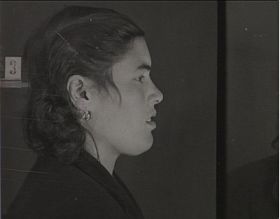


Susana de Sousa Dias: 48

This is gonna be a bit longer blog text than usual. Simply because this is an extraordinary film that calls for more than an ordinary review. My co-blogger Allan Berg wrote – in Danish and after having seen 30 minutes of the film – that this would probably be the film experience of his festival viewing. It was definitely what it became for me. My hope is that the following will inspire festivals to introduce a totally different approach to writing history. To deal with memories. To seek a new minimalistic film language. And work with music and sound in a new way.
First an introduction to the team behind the film; the info is taken from their website: The director Susana de Sousa Dias – completed a thesis in Aesthetics and Art Philosophy and holds University degrees both in Painting (Lisbon University) and Cinema (National School of Theatre and Cinema). She studied music at the National Conservatory of Music and is currently preparing a PhD in Aesthetics, Art Science and Technology (University Paris 8). The producer Ansgar Schaefer – graduated in German Language and Literature and Political Science. Works as a historian and university professor. The sound designer António de Sousa Dias – composer, Ph.D. in Musicology (Paris VIII) sponsored by the Portuguese Scientific Foundation FCT. Is currently developing a research work on CAC – Université Paris VIII / MSH Paris Nord in the field of music creation and virtual environments.
An academic film team would normally make me, a documentary addict, shiver with fear for the outcome of “48”, in this case no, for that simple reason
that I had seen the team’s previous film that perfectly combined the background of aesthetics, philosophy, history and music with a creative intention.
And with a sense for image and sound, and the putting the two together. To convey with “Still Life. Faces of a Dictatorship” (2005) the traumatic past of Portugal under Salazar. The film is 77 mins. long without any narration, built on archive from the 48 years between 1926 and till 1974, when the carnation revolution happened. The archive includes news, war footage from the colonies, propaganda films and photos of political prisoners. The musical score for this film, by António de Sousa Dias, is exceptional, first you wonder why but then you see what it does to the images, making a reflective distance and opens for a new both intellectual and emotional interpretation.
The same is the case in “48” where the sound design is made to make space around the voices of the political prisoners. But not only what they say come to the ear, also sounds of them being in a room to be interviewed and other sounds, as far as I could hear(!) that are made to match with the image and create the tense atmosphere.
Image after image, the prison ID´s, en face, profile left, profile right, faces of people looking at you, and looking at the photographer, who in many cases took part in the infamous torture conduct, described by the human beings behind the faces. They express anger and dignity, how could they be like that? It is terrible to watch what they say, in your head you make your own images. And then suddenly come voices that go for some absurd anecdotes from the prison life. Relief and a little smile. There is a work with details in very refined ways: A tiny light change in the photo is suddenly made, a fine almost imperceptible camera movement, the face comes closer or moves away.
One woman has suffered a lot because she smiles on her photo. How stupid of me to laugh! In the film context, the smile becomes one of defiance. In many cases there are more than one photo of the same person imprisoned more than once. They normally remember the photographic session. They remember the atrocities. They visualise them. In a way the film builds one long monologue changing visually at the end with some shots from Mocambique, a barbed wire fence, a tree, a camp – the prisoners talking did not have the photos any longer.
Let me end with the words of Allan Berg, translated and edited from Danish: “The portraits of the Secret Police appear calm and clarified for a long time on the screen. The ugly operation has lent the beauty, dignity and authenticity of the models… the images are carefully worked on so their aura become visible. The naked sound of the voices from the conversations are treated like was it delicate music. So it becomes delicate music. It is about the political crime of the Portuguese dictatorship… it is so horrifying and wild, and it is conveyed with such a beautiful and calm clarification”.